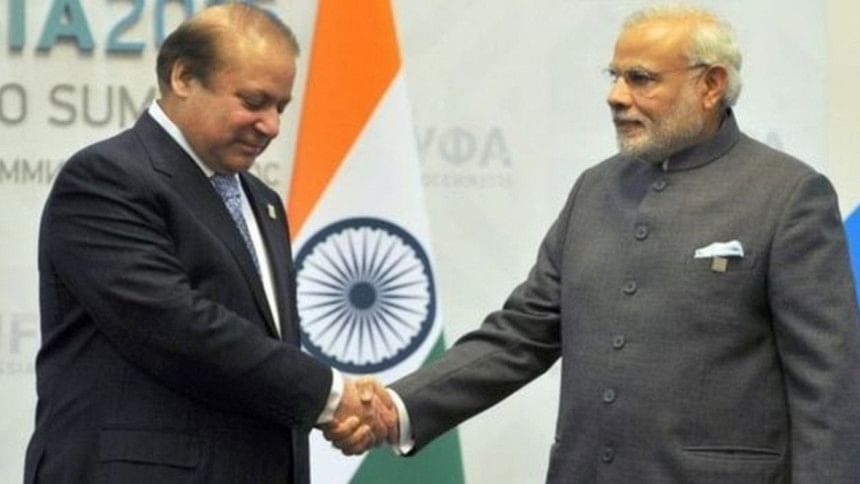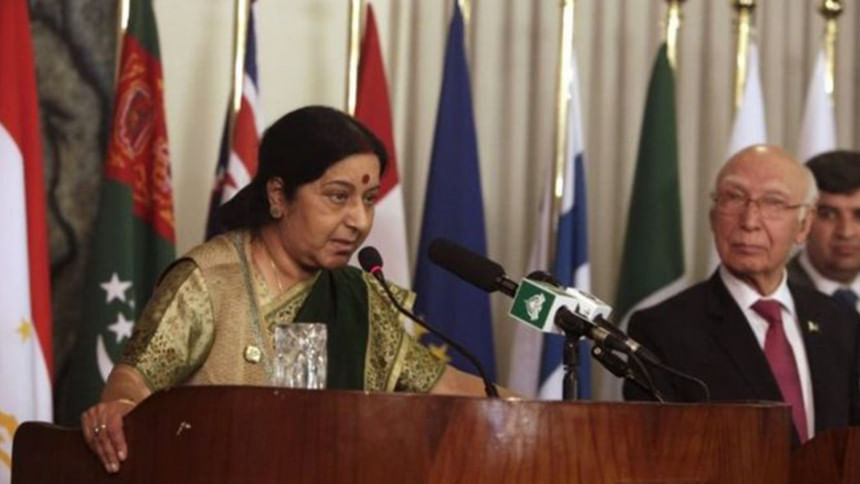How India, Pakistan resumed peace talks

India and Pakistan have agreed to resume high-level peace talks after a stalemate of three years.
The announcement came after two weeks of hectic diplomatic activities between the nuclear-armed neighbours.
The efforts resulted in Wednesday's announcement in Islamabad that the two countries would talk on all outstanding issues, including terrorism and the thorny issue of Kashmir.
Diplomatic thaw
The first sign of a thaw came when Indian Prime Minister Narendra Modi held a brief meeting with his Pakistani counterpart Nawaz Sharif at a climate change conference in Paris on 1 December.
The leaders smiled and posed for cameras in Paris.
But there was more to their meeting, senior diplomats from the two countries had been holding back channel discussions.
All this culminated into a meeting of the National Security Advisers (NSA) of the two countries in Bangkok on Sunday. A statement issued after the meeting said they had talked about terrorism, Kashmir, peace and security.
This paved the way for Indian Foreign Minister Sushma Swaraj's visit to Pakistan on Wednesday to attend a security conference on Afghanistan.
Swaraj said in Islamabad that the foreign secretaries of both countries would meet soon to set an agenda for meetings on "peace and security".
Delhi and Islamabad gave up their tough positions on two key issues to achieve this result.
India agreed to keep Kashmir on the agenda and Pakistan promised to speed up the trial of those India blames for the 2008 Mumbai attacks.
The release of Zaki-ur-Rehman Lakhvi, whom India accuses of masterminding the 2008 Mumbai attacks, from a Pakistani jail in April this year has upset Indians.
The South Asian rivals have fought two wars and a limited conflict over Kashmir, which is claimed by both countries in its entirety.
Bangkok breakthrough

The neighbours needed a breakthrough to come out of the diplomatic cul-de-sac and plan two high-level visits of Indian leaders to Pakistan.
And they found this in Bangkok, away from the gaze of the nationalistic media outlets of the two countries.
Swaraj needed a ready platform to announce the resumption of peace talks in Islamabad and the successful negotiations in Bangkok gave her that.
This breakthrough will also give enough time to the two sides to prepare for Modi's visit to Pakistan. He has accepted Sharif's invitation to attend a regional summit of South Asian leaders in Islamabad next year.
Some analysts said that the appointment of Lt-Gen Naseer Khan Janjua as Pakistan's NSA also motivated India to go ahead with peace talks. Lt-Gen Janjua is from the powerful army of Pakistan and can influence decision-making in Islamabad.
The two countries have also agreed to work together on counter-terrorism in the region. The looming presence of Islamic State jihadi group has been a source of concern for both India and Pakistan.
Troubled ties
The recent announcement has come after what many describe as a series of "diplomatic blunders" in the past year.
Sharif had attended Modi's inauguration in May last year, raising hopes of a revival of the stalled peace talks.
But in the next one year, the two sides struggled to arrange any meaningful dialogue. They blamed each other for cross-border firing in Kashmir.
The initial optimism slowly fizzled out.
However, a breakthrough came when the two prime ministers met in the Russian city of Ufa in July on the sidelines of the Shanghai Cooperation Organisation summit.
Their joint statement said that all "issues of bilateral and regional interests" would be discussed between their NSAs.
But the meeting was cancelled in August after India refused to keep Kashmir on the agenda.
Low expectations

Despite the breakthrough, not many expect any resolution of outstanding issues like Kashmir, water-sharing and boundary disputes.
The success of the talks can be largely measured by the situation on the de facto border that divides Kashmir between the two countries.
But there are expectations that bilateral trade, tourism and cultural exchanges are likely to increase.
The governments on both sides will be mindful of the presence of the hardliners.
The BBC's M Ilyas Khan in Islamabad says some ultra-nationalists in Pakistan are continuing to harp on the line that "there can't be any peace" until the Kashmir issue is resolved.
This lobby is traditionally critical of any likely Pakistani intention to enhance trading ties with India or allow its traders overland access to Afghanistan.
At the same time, ironically, they criticise Afghanistan for denying a similar transit of gas and electricity lines from Central Asia to Pakistan, our correspondent adds.

 For all latest news, follow The Daily Star's Google News channel.
For all latest news, follow The Daily Star's Google News channel. 







Comments